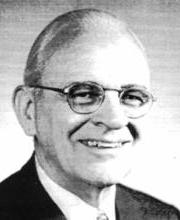Robert Winthrop White
Personality and Motivation for Competence
Effects of Personality on Political Opinions

White was appointed Instructor in Psychology in 1937 and began his lifelong teaching career at Harvard. Twenty years later he was the Chair of the Department of Social Relations (created in 1946 and merged with Psychology in the 1970s). White convinced McGeorge Bundy, Dean of the Faculty of Arts & Sciences (and later, National Security Advisor to Presidents John F. Kennedy and Lyndon Johnson) to hire Erik H. Erikson in 1960 as a Professor of Human Development (even though Erikson’s only formal academic credential was a Montessori Teaching Certificate). White himself had been promoted to Professor of Clinical Psychology in 1958, having served from 1946 to 1950 as the Director of the Harvard Psychological Clinic (founded in 1926 by Morton H. Prince) and the first head of the PhD program in Clinical Psychology.
A dedicated teacher, White wrote the popular textbook The Abnormal Personality and a complementary text, focusing on normal development, The Enterprise of Living: A View of Personal Growth. In his theoretical work, White built upon his contributions to Murray’s seminal Explorations in Personality: A Clinical and Experimental Study of Fifty Men of College Age, a collaborative study of Harvard undergraduates in the 1930s. The research was cross-sectional, and White leaned on his training as a historian to establish his own contrasting longitudinal research paradigm. This culminated in his 1952 classic, Lives in Progress: A Study of the Natural Growth of Personality, which studied three individuals over time. White collaborated with Jerome Bruner and M. Brewster Smith in writing Opinions and Personality, the cardinal study of politics and personality.
White’s most famous contribution was a 1959 Psychological Review paper which emphasized that competence is a fundamental human drive, which contrasted with the focus on sex and aggression within the then-influential psychoanalytic theory. White enriched the study of personality and motivation with his ideas of the effectance urge, the sense of efficacy, and the concept of competence.
In White’s last year, he received the Murray Award of the Society for Personality and Social Psychology (Division 8 of the American Psychological Association). In 2002, Brewster Smith wrote, “It is time that Robert White be recognized as a major contributor to humanistic psychology” (Smith 2002, p. 12).
Sources
Anderson, J. W. (2013). The life of Robert W. White: A psychobiographical exploration. Unpublished manuscript, Northwestern University, Evanston, IL.
Maher, B. A., White, S. H., Bales, R. F., & Maybury, D. H. P. (2002). Robert Winthrop White. Memorial minute placed upon the records at a meeting of the faculty of arts and sciences. Cambridge, MA: Harvard University.
Ouellette, S. C. (2010). Robert W. White: A life in the study of lives. In W. Pickren & D. Dewsbury (Eds.), Portraits of pioneers in psychology (Vol. 7). Washington, DC: American Psychological Association.
Runyan, W. M. (2005). Evolving conceptions of psychobiography and the study of lives: Encounters with psychoanalysis, personality psychology, and historical science, Chapter 2. In W. T. Schultz (Ed.), Handbook of psychobiography (pp. 19–41). New York: Oxford University Press.
Smith, M. B. (2002). Robert W. White [1904–2001]: Humanistic psychologist. Journal of Humanistic Psychology, 42, 9–12.
Watt, N.F., & McGovern, J.S. (2019) Robert W. White. In V. Zeigler-Hill & T.K. Shackelford (Eds.) Encyclopedia of Personality and Individual Differences. Springer International Publishing AG.
Wessman, A.E., & Murray, H.A. (1957). Harvard psychological clinic 1927–1957: Its founder, aims, methods, members, graduates and contributions to knowledge (Thirtieth Anniversary Committee). Cambridge, MA: Harvard Psychological Clinic.
White, R.W. (1922–1993). Papers of Robert Winthrop White [unprocessed accessions]. Cambridge, MA: Collections of the Harvard University Archives, Faculty Archives.
White, R. W. (1959). Motivation reconsidered: The concept of competence. Psychological Review, 66, 297–333.
White, R. W. (1960). Competence and the psychosexual stages of development. In Nebraska symposium on motivation (Vol. VIII, pp. 97–141).
White, R.W. (1963a). Ego and reality in psychoanalytic theory (Psychological Issues, Vol. 3, No. 3. Monograph 11, pp.1–211). New York: International Universities Press.
White, R. W. (1963b). Sense of interpersonal competence: Two case studies and some reflections on origins. In R. W. White (Ed.), The study of lives: Essays on personality in honor of Henry A. Murray. New York: Atherton Press.
White, R. W. (1974b). Strategies of adaptation: An attempt at systematic description. In G. V. Coelho, D. A. Hamburg, & J. E. Adams (Eds.), Coping and adaptation. New York: Basic Books.
White, R.W. (1979). Competence as an aspect of social growth. In M.W. Kent & J.E. Rolf (Eds.), Primary Prevention of Psychopathology. Volume III. Social competence in children. (pp. 5-22). Hanover, NH: University Press of New England.
White, R. W. (1981). Exploring personality the long way: The study of lives. In A. I. Rabin, J. Aronoff, A. M. Barclay, & R. A. Rucker (Eds.), Further explorations in personality. New York: Wiley.
White, R. W. (1987). A memoir: Seeking the shape of personality. Marlborough, N.H: The Homestead Press. (printed for private distribution; David W. White, sole surviving son, currently controls its distribution).
White, R.W. (1991). Primary sources on his confidential case materials can be accessed through the Henry A. Murray Research Archive at Harvard University, Cambridge, MA.
https://en.wikipedia.org/wiki/Robert_W._White_(psychologist)